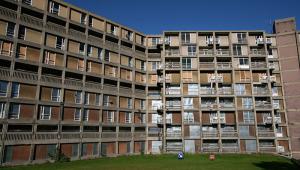By Neil Merrick
Government grants for house building could all but disappear following the next Comprehensive Spending Review, the chief executive of one of England’s largest housing associations has warned.
David Montague, chief executive of the London & Quadrant Group, said registered social landlords wishing to build new homes would become dependent on private borrowing and income from rents and property sales.
Speaking at the Chartered Institute of Housing’s annual conference, held in Harrogate on June 16–18, he forecast that the sector was heading for a ‘public expenditure cliff’ after 2011.
‘We’ve got to drive down operating costs to improve our borrowing capacity,’ he told a session on house building. ‘Private investment is likely to be the only game in town.’
At the same time, low-cost housing, which allows residents to combine a mortgage with rent paid to an RSL, could also become a distant memory.
Many banks see mortgages for
shared-ownership schemes as ‘sub-prime’ and are no longer willing to offer them to first-time buyers, he told delegates in Harrogate.
‘A 30-year model is at risk of being strangled because of lender reluctance,’ Montague said. He added that in future RSLs were likely to offer a range of rents based on income rather than a mix of tenures.
Mark Amis, head of social housing at Lloyds TSB, said banks were ‘starting to get their houses in order’ following the credit crunch and were likely to increase lending even though RSLs could not expect to borrow at the same rates as before.
‘Bond markets are reopening and institutional investors are coming back into the market,’ he said. ‘Banks are starting to remodel how they lend and are looking for more short-term lending.’
During the conference, the Homes and Communities Agency announced that it was setting up an advisory group to look at new sources of private investment for affordable housing.
Sir Bob Kerslake, the HCA’s chief executive, said the ‘freefall’ in the number of new homes built had ceased but he was concerned that numbers would not rise again fast enough.
Private builders banking on the HCA to kick-start developments might have to accept less money for land than they initially hoped. ‘We have some leverage with private developers,’ he told delegates.
‘They need the public sector and we’re looking for some trade-off. Everybody is going to have to give something.’
Government grants for house building could all but disappear following the next Comprehensive Spending Review, the chief executive of one of England’s largest housing associations has warned.
David Montague, chief executive of the London & Quadrant Group, said registered social landlords wishing to build new homes would become dependent on private borrowing and income from rents and property sales.
Speaking at the Chartered Institute of Housing’s annual conference, held in Harrogate on June 16–18, he forecast that the sector was heading for a ‘public expenditure cliff’ after 2011.
‘We’ve got to drive down operating costs to improve our borrowing capacity,’ he told a session on house building. ‘Private investment is likely to be the only game in town.’
At the same time, low-cost housing, which allows residents to combine a mortgage with rent paid to an RSL, could also become a distant memory.
Many banks see mortgages for
shared-ownership schemes as ‘sub-prime’ and are no longer willing to offer them to first-time buyers, he told delegates in Harrogate.
‘A 30-year model is at risk of being strangled because of lender reluctance,’ Montague said. He added that in future RSLs were likely to offer a range of rents based on income rather than a mix of tenures.
Mark Amis, head of social housing at Lloyds TSB, said banks were ‘starting to get their houses in order’ following the credit crunch and were likely to increase lending even though RSLs could not expect to borrow at the same rates as before.
‘Bond markets are reopening and institutional investors are coming back into the market,’ he said. ‘Banks are starting to remodel how they lend and are looking for more short-term lending.’
During the conference, the Homes and Communities Agency announced that it was setting up an advisory group to look at new sources of private investment for affordable housing.
Sir Bob Kerslake, the HCA’s chief executive, said the ‘freefall’ in the number of new homes built had ceased but he was concerned that numbers would not rise again fast enough.
Private builders banking on the HCA to kick-start developments might have to accept less money for land than they initially hoped. ‘We have some leverage with private developers,’ he told delegates.
‘They need the public sector and we’re looking for some trade-off. Everybody is going to have to give something.’



















